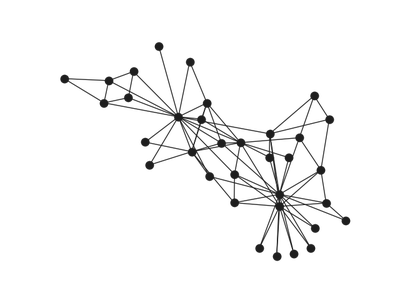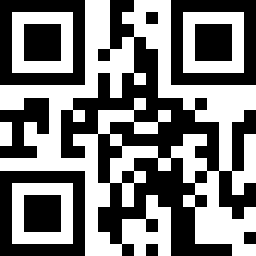CSL7390: Social Network Analysis
If you register for CSL4040: Social Networks, please visit the specific course page.
Table of Contents

Logistics
- Credits L-T-P [C]: 3-0-0 [3]
- Expectation from 7000 level course:
- 1 Contact Hr + 3 Non-Contact Hr
- Learn by Research
- Where:
- Executive: Google Meet (Link Available in Moodle)
- Others: Room no 104
- Slot: R (Thursday 6:00PM - 7:30PM, Saturday 4:00PM - 5:00PM)
- LMS: Moodle
- Credential: Internet ID/Password
- Easy Enrollment Code: thr2u8
- Easy Enrollment QR

Syllabus
- SNA Introduction
- Graph Recap: Graph Introduction: Adjacency Matrix, Paths, Connectivity, Incidence Matrix, Distance, Breadth-First-Search, Directed Graph
- Network Measures, Centrality, Strong and Weak Ties, Cliques, Component, Structural Balance
- Network Models: Random Networks, Scale-Free Networks, Barabási-Albert Model, Fuzzy-Granular Social Network, Generating Network Data
- Game Theory and Network Traffic Modeling
- Information Cascade, Epidemic spread modeling,
- Small-World
- Community Detection Problem
- Link Prediction Problem
- Evolving Network and Temporal Network
- Python NetworkX
Learning Materials
Textbook
- Networks, Crowds, and Markets: Reasoning About a Highly Connected World, by David Easley and Jon Kleinberg, (Cambridge University Press - Sep 2010) - Prepublication draft available online. http://www.cs.cornell.edu/home/kleinber/networks-book/
- Network Science, by Albert-Laszlo Barabasi, (Cambridge University Press - August 2016) freely available under the Creative Commons licence. http://www.networksciencebook.com/
- Networks, by Mark Newman, (Oxford University Press, 2nd-edition - Sep 2018)
Reference Books
- Complex and Adaptive Dynamical Systems, by Claudius Gros, (Springer, 4th Edition - 2015).
- The Structure of Complex Networks Theory and Applications, by Ernesto Estrada, (Oxford University Press - Dec 2011).
- Exploratory Social Network Analysis with Pajek, by Wouter de Nooy, Andrej Mrvar, and Vladimir Batagelj, (Cambridge University Press, 3rd Edition - July 2018)
Self Learning Material
Attendance Requirement
As per the notification from academics 100% attendance is mandatory. If you have genuine reason please take leave approval as per academics rule.
If attendance falls below 75%, one should get at least C grade to pass the course. Otherwise F grade will be assigned.
Grading Policy
| Interactive Videos | Quizzes (Moodle) | Project |
| 10% | 10% | 30% |
| Coding Assignment | Minors | Major |
| 10% | 10% + 10% | 20% |
Interactive Video (Moodle)
All the topics in the syllabus is covered in interactive videos where all the videos are embedded with questions. Answer the questions and get the grades. You can try as many times as you wish and improve your scores.
Quizzes (Moodle)
- There will be about 4-6 quizzes; best 3/4 will be considered for grading.
- All the quizzes will be in Moodle Platform.
- No makeup quiz will be taken considering there will be more than required no of quizzes.
Coding Assignments
- There will be many coding assignments, about 8-10.
- Least 2 scores will not be consider for grading.
- Preferably with NetworkX in Python
Project
- Report: 30%, Presentation: 20%, Project Work: 50%
- Grading will be based on:
- Organization: Applicable to Reports and Presentations
- Clarity: Applicable to Reports/Presentation/Work/Interaction
- Length: Too Short/Too Long will be penalized (report/presentation)
- References: Correct and Comprehensive References
- Correctness: Applicable to Development and Contributory Work
- Significance/Coverage: Significance for Contributory Work, Coverage for Survey/Review
- Originality: Plagiarized Content of any form (textual, formulation, images, results) will mark zero for the project component.
- Contribution: Quality of Contribution
- Consideration for A* Grade: Paper submission to above average conference (at least) along with total no of marks.
Project can be done in groups not more than two members.
Important Dates:
- 10/Aug: Last date of group identification
- 17/Aug: Topics will be floated
- 31/Aug: Last date for Topic selection
- 06/Oct: Mid-term project assessment presentation
- 08/Oct: ^^ if necessary
- 31/Oct: Abstract Submission
- 6/Nov: Report Submission
- 10/Nov: Feedback Release
- 17/Nov: Revision Submission
- Presentation dates will be announced (tentative: Nov 5, 10, 12)
- Quiz dates will be announced during class
Plagiarism tolerance is 7% from single source and 15% cumulative, anything more will reduce your marks as follows:
- Any logical/conceptual/formulation plagiarism: zero marks
- Other form of plagiarism (above 50%): zero marks
- Otherwise: Percentage of plagiarism will be deducted from the obtained mark